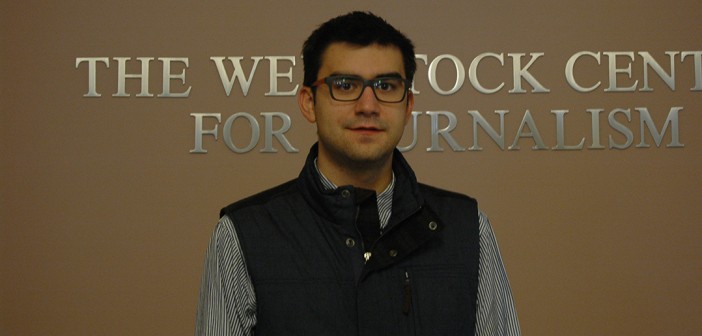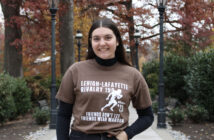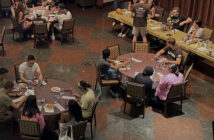Of Lehigh’s 300 international students from 50 countries all over the world, three students – from China, Macedonia and Ireland – identified food and the social scene as two major differences between being at Lehigh and being in their native countries.
“The toughest issue to overcome? I would have to say food,” said Sean Wang, a graduate student from Harbin, China. Wang, who is working on getting his master’s degree in accounting, said he misses his mother’s cooking. He said finding a way to make food similar to the food in his native country has been a challenge living in America.
Gorgi Pavlov, a Ph.D. candidate in chemical and biomolecular engineering from Macedonia, agreed with Wang. Pavlov said that once when his parents visited, they went to Yianni’s Taverna right off campus to try the most Mediterranean food they could find, but did not have success.
“The food looks the same but tastes completely different,” Pavlov said.
Caroline Nee, a graduate student and native of Ireland, said Irish chocolate is one aspect of life she misses most, but the biggest difference in food here is what she sees in the supermarket. Often times, she doesn’t recognize the products, which makes it difficult to find what she needs. She also noticed that the sizes of products she would buy were always more than she needed.
The party culture, in the United States and at Lehigh in particular, is another change that these students noted. In Wang’s hometown, he said occasionally there are parties for festivals and birthdays, but parties are not a weekly occurrence as they are here.
“I feel there are a lot of parties here in America,” he said. “I value my private life, so one problem has been the drinking. I see why people enjoy it, but it has been a difficult change.”
For Pavlov and Nee, because of the lower age restrictions on alcohol in their countries, the party scene has been different structurally, but they weren’t so surprised with going out every weekend.
“In Macedonia, there is a much more relaxed atmosphere, probably because kids have access to alcohol earlier in life,” Pavlov said. “People go out every weekend on Fridays and Saturdays. High school kids go to clubs or cafes.”
He said that because there is a relaxed attitude on alcohol and because kids have access to it earlier, they’ve been acclimated to drinking and have had the necessary conversations on drinking before they go to college. He said that kids don’t go to house parties as much, but would rather mostly go in small groups of friends out to club.
Nee had a similar experience in Ireland. She said that the party culture was also big like it is at Lehigh, but depending on the night, she and her friends would start at a house party and then go into the “city centre” to a night club at around 11 p.m.
Language is another issue for the three students. Wang said it’s easier to understand than it is to speak, and that it definitely has been a barrier socially. They all agreed that because of the international standardized tests they had to take to prove their proficiency in English, taking classes in English and understanding English was not an issue.
“I was up for the challenge that would be Lehigh,” Pavlov said.
Nee mentioned that in Ireland, the class sizes where she went to school were much larger and there was little participation. Participating in class and speaking up took some getting used to, she said.
Pavlov said that in working with other students on group work, there were certain social conventions about Americans that he had to learn. He said that when working with a group in class, the breakdown of the different jobs was confusing for him.
“In Macedonia, it’s more clear cut with who will do what, in America it’s less direct, which is something I had to overcome,” Pavlov said. “People tend to beat around the bush.”
Another linguistic issue he ran into was sarcasm. He said that it is much more common in the U.S. for people to use sarcasm, and often he would have to ask people if they were being sarcastic or not.
“They usually would laugh, but it was better for me to ask so I could learn,” he said.
Wang, Pavlov and Nee seem to be enjoying their time in the U.S. They said they miss their families, friends and native food, and Nee mentioned wishing she had her car to drive around, but besides that they said they are having a good experience.
“I can make my own decisions about almost everything,” Wang said.
That was something that he has really enjoyed about the U.S., because the relationship between parents and their children is not so hands-off in China. He talked about how in the U.S., kids are allowed and encouraged to try different activities and have hobbies, another aspect he likes about the U.S. He also enjoys the freedom in general that makes the U.S. a great place to live. Wang and Pavlov both agreed that the mixture of cultures in the U.S. makes it welcoming and easy to be here as a foreigner.
“In America, people have every right to be whatever they want to be,” Wang said.
Wang, Pavlov and Nee said they are all open to the possibility of permanently living in the U.S. Wang said he certainly wants to live here and wants his parents to move here, but they haven’t made the decision yet. Pavlov also said that he wants to live here because he believes the U.S. is a much more stable place. Nee said she is unsure and said that it will depend on where she ends up starting a career.






Comment policy
Comments posted to The Brown and White website are reviewed by a moderator before being approved. Incendiary speech or harassing language, including comments targeted at individuals, may be deemed unacceptable and not published. Spam and other soliciting will also be declined.
The Brown and White also reserves the right to not publish entirely anonymous comments.